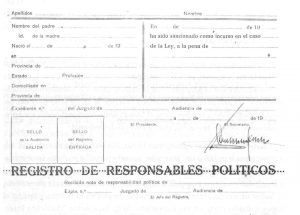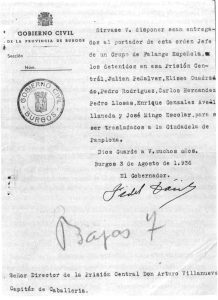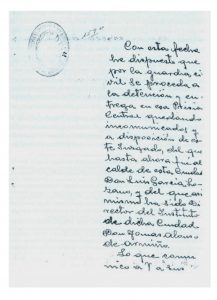The New State, already at the beginning of the military uprising, established the priority of the Code of Military Justice over the Criminal Code and Military jurisdiction is imposed over the ordinary, with absolute absence of legal guarantees.
REVISARRRRR
Civil Repression: Depurations and Seizure of Property
The Political Responsibilities Law, which came into force in 1939, and the Law of Purge of Officials established the definitive channels for the purge of responsibilities of individuals and officials. The sanctions imposed were non-appealable and consisted on forced relocation, disqualification from holding office and final separation from service.
The Political Responsibilities Act stated in its preamble that it was necessary to “settle the guilt of political responsibilities for those who had contributed serious acts or omissions to forging the red subversion”. The first defendants would be:

- Those condemned by the military jurisdiction for crimes of rebellion, adhesion, aid, against the Glorious National Movement.
- For having held managerial positions in parties, groups and associations declared outlawed.
- For having belonged to such parties or groups, as an affiliate.
- For having held positions by appointment of the Government of the Popular Front.
- For having been publicly signified in favor of the Popular Front or of the parties or similar groups.
- For having participated in the elections of 1936, as candidate, proxy or comptroller of any of the parties of the Popular Front.
- For belonging or having belonged to Freemasonry.
- For having intervened in courts in charge of judging people addicted to the National Movement.
- For having excited or induced to the realization of the above facts by word of mouth or by means of the printing press, the radio, etc.
The purification procedure could be initiated on the grounds convicted by the military authority, either ex officio or by complaint. An example of a complaint is shown below:
“… dangerous Marxist elements, etc., a reader of leftist newspapers, who has carried out a disastrous task of anti-religious and anti-patriotic indoctrination from the school, etc.”.

The mostly crude and unfounded allegations, the result of envy and rivalry, were usually made in a written statement signed by the accuser and addressed to the Court of Political Responsibilities.
The sanctions fell into three groups:
- Group I (activity restricting): absolute disqualification; spatial disqualification.
- Group II (restricting freedom of residence): alienation; relegation to our African possessions; confinement; exile.
- Group III (economic): total loss of goods; payment of a fixed amount; loss of certain goods.
In the presence of the Regional Court of Political Responsibilities, in the province of Burgos, 286 cases of preventive seizure of property were investigated before the entry into force of the Political Responsibilities Act and 718 since the entry into force of the Political Responsibilities Act.
Military repression: military regulations and summary trials
The uncontrolled repression or “rides” were carried out from the first days of the uprising, especially in the villages, where it was common for a group of phalangists to come to the victim’s house at night, arrest him and shoot him in the surroundings of another nearby village.

The enactment of New State Laws translates into a series of urgent criminal procedures, the most widely used of which is the summary one. The penalty for these trials could be death or life imprisonment, but also other lesser penalties. All those who committed crimes such as rebellion, possession of weapons, holding meetings, conferences or demonstrations, which made it difficult to supply the population, restricted the freedom to contract work or abandoned it, were subjected to this urgent procedure. The judgements were characterized by arbitrariness in their application.
In those early August, September and October, just as the volume of admissions to the Burgos prison was considerable, so was that of releases or “sacks”. These were prisoners “released”, handed over to law enforcement officers to be taken somewhere and then shot. Politicians, military, civil servants, teachers, writers and craftsmen were arrested.